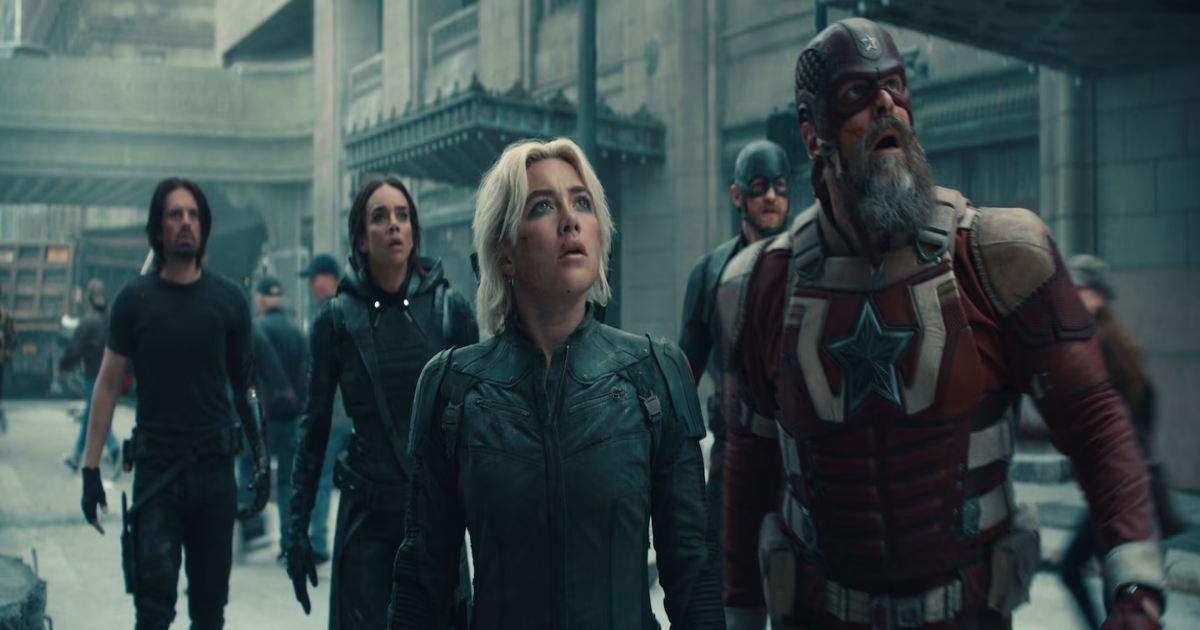That’s the mood that engulfs “Thunderbolts*” from its opening scene, when Yelena Belova (Florence Pugh) contemplates the ennui-inspiring routine of her life as a highly trained assassin, staring into the void from the top of the world’s second-highest building in Kuala Lumpur, then going through the murderous motions in a top-secret science lab. It’s all very gotta-make-the-doughnuts — similar to Jon Bernthal’s casually brutal, oh-so-over-it hit man in “The Accountant 2” — and it’s a meta-reflection of the Hollywood culture “Thunderbolts*” lives in: This is reportedly the 36th movie in the Marvel Cinematic Universe, being released on the franchise’s 17th anniversary and closing out Phase 5 of its endless rollout. Are we done yet? Will we ever be done? Do we want to be done? Even the superheroes have superhero fatigue.
Marvel, of course, knows what we’re thinking, as evidenced in a self-deprecatory wink during an end credits montage. One reason the Avengers movies and their spin-offs were successful — before they became hopelessly mired in their own mythos — was their willingness to not take themselves all that seriously. “Thunderbolts*” demonstrates both the strengths and weaknesses of that strategy as a movie that includes some genuine wit but also a tiresome amount of what has become the series’s signature in-jokey sarcasm. Nominally, this is a follow-up to “Black Widow,” in which Scarlett Johansson played Yelena’s flame-haired Avenger sister Natasha; that came out four years ago, meaning that “Thunderbolts*” needs to engage in a fair amount of exposition, a problem screenwriters Eric Pearson and Joanna Calo solve with eye-rolling recaps and snarky asides. (“Thunderbolts*” has been adroitly directed by Jake Schreier.)
What’s it about, you ask? Beats me. As “Thunderbolts*” opens, Yelena is working for the dastardly Valentina Allegra de Fontaine, who is using her position as director of U.S. intelligence to engage in some shadowy activities in a mountain facility in the far West; under investigation by Congress — where Winter Soldier Bucky Barnes (Sebastian Stan) is now representing the Great State of Brooklyn — Valentina orders Yelena to fend off a spy in the facility, only for Yelena to discover that she’s also sent John Walker/U.S. Agent (Wyatt Russell) and Ava Starr (Hannah John-Kamen), a.k.a. Ghost. While there, they meet a spaced-out rando named Bob (Lewis Pullman), who turns out to be an important part of the puzzle. Soon, the ragtag team of “disposable delinquents” are banding together to fend off Valentina’s ruthless self-preservation instincts and foil her evil plot.
Oh, who are we kidding? The fans who flock to “Thunderbolts*” aren’t there for the story as much as to see what the Great Machine of their rabid pop culture loyalties will extrude next. Which presents the central contradiction of this installation: As yet another widget in the Marvel factory, it’s utterly unnecessary, except to set up another cash grab exciting opportunity for imaginative world-building. (Hence the annoying asterisk in the title.) After a series of duds, “Thunderbolts*” has also been positioned as the movie that will resuscitate an enterprise feared to be in painful creative decline.
Within those dubious parameters, “Thunderbolts*” works surprisingly well. Marvel’s formula has always been its genius for casting, going all the way back to enlisting Robert Downey Jr. for “Iron Man.” Since then, the secret sauce has been using really good actors to bring emotional depth and coloration to characters who are otherwise interchangeable in a genre that, at its worse, is easily dismissed as cape-, um, stuff.
That principle holds impressively true in “Thunderbolts*,” which features a superior cast of players in roles that actually go deeper than exotic firepower and supercool stunts: Pugh, possessed of a face made for cinema, brings bruised, emotionally expressive beauty to Yelena’s tough-girl act; when Yelena’s father, Alexei (David Harbour), the retired Soviet super-soldier Red Guard, shows up, the two cook up genuinely amusing and eventually touching chemistry. As Valentina, Julia Louis-Dreyfus does a graceful job of both banishing and leaning in to her “Veep” persona: Back when she first appeared in “Black Widow,” no one could have known who would be the real-life director of national intelligence in 2025; with her overweening ambition and Sontag-esque gray streak, Valentina turns out to be an eerily on-point mash-up of Selina Meyer and Tulsi Gabbard. (Geraldine Viswanathan, a welcome addition to any ensemble, plays Valentina’s beleaguered aide.)
Call it the film critic’s version of Stockholm syndrome, but in between the requisite fight sequences and snippy-sniping dialogue, I found the thematic elements of “Thunderbolts*” to be unexpectedly effective, even profound: The “team of scrappy antiheroes” that Alexei is determined to put together turns out to be fighting something more cosmic than an arrogant authoritarian with no respect for democratic process or the rule of law, although that alone would make “Thunderbolts*” a timely wish-fulfillment fantasy. Instead, their foe turns out to be both more cosmic and deeply personal, in the form of the shame, trauma and unresolved history just about everyone shares.
“Thunderbolts*” may still be capestuff. It’s certainly a movie nobody asked for, as Marvel itself acknowledges. But it’s here. And it’s just fine.
PG-13. At area theaters. Contains strong violence, profanity, thematic elements and some drug references. 126 minutes.
